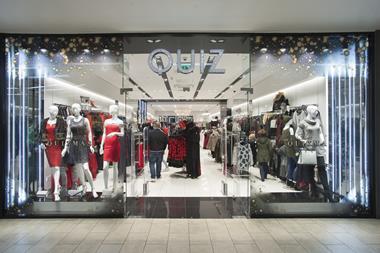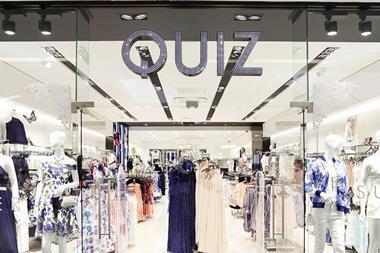Quiz has swung to a loss before tax and seen its underlying EBITDA more than halve in what the fast-fashion group called a “continued challenging market”.
In the six months to September 30, 2019, the fast-fashion brand reported a loss of £6.8m, down from a profit of £3.8m for the same period in 2018.
Underlying EBITDA fell 54% to £2.7m, and underlying profit before tax fell 85% to just £0.6m.
Quiz also reported a 5% fall in group revenue to £63.3m, down from £66.7m the previous year.
EBITDA inched up 4% to £5.8m, while sales from UK stores and concessions plummeted 11% to £31.3m.
The retailer flagged that online sales remained “consistent” at £20m, while international sales inched up 3% to £12m.
Underlying online revenue increased 7% to £20m, while sales on Quiz’s own website rose 12% driven by an 11% increase in web traffic.
Quiz reported a 7% increase in international franchise sales and opened two new stores and nine concessions during the period.
Founder and chief executive Tarak Ramzan said: “The group’s performance has resulted in an underlying profit before tax of £0.6m. Whilst it is disappointing to report a decline in profits year-on-year, management is focused on implementing the actions identified further to the group’s business review conducted earlier in 2019. We are pleased to report progress improving gross margins and reducing costs across the business and will look for further improvements to develop our omnichannel offering.
“Quiz has continued to achieve sales growth in its international business and, in particular, online despite the challenging trading conditions. This has been supported by effective marketing investment including a successful collaboration with TV star Samantha Faiers.
“The group has continued to generate cash and had £7.2m of cash at the period end. The Board remains firmly focused on further improving the group’s financial performance and growing revenues with a strong focus on Quiz’s online and international channels.
“The exceptional charge incurred in relation to store impairments and onerous leases is partially attributable to the structural shifts whereby consumers are increasingly shopping online. We have a clear customer focus, a healthy brand and a flexible model that the Board believes will enable Quiz to adapt to the changing retail environment and return to profitable growth in the medium term.”
























No comments yet